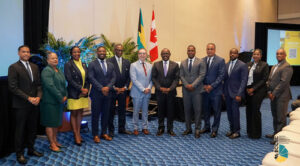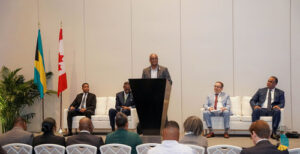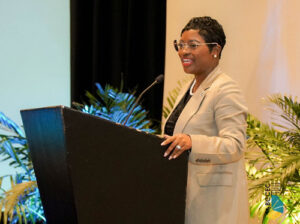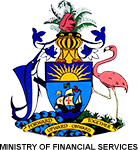Bahamas-Canada Innovation Trade Mission
10 Mar 2025

Officials from the Bahamas Chamber of Commerce and the Governments of Canada and The Bahamas
The mission aimed to create enduring synergies between Bahamian and Canadian businesses
The Bahamas-Canada Innovation Trade Mission, held in Nassau from February 26th to 28th, 2025, served as a vital platform for private-sector stakeholders from both nations to come together, strengthen bilateral relationships, and explore new business opportunities. It provided a unique opportunity for participants to engage in meaningful discussions on fostering strategic partnerships.
The mission’s focus on sustainable growth and innovation allowed attendees to delve into potential collaborations across critical sectors, including hospitality technology, agritech, clean energy, fintech, and education. The overall aim of the event was to create enduring synergies between Bahamian and Canadian businesses, with a strong emphasis on resilience and innovation as essential pillars for thriving in an increasingly competitive and unpredictable global economy.
The mission began with site visits on Day 1, offering Canadian business leaders a firsthand opportunity to explore The Bahamas’ economic landscape and gain insights into its business environment. These visits highlighted the country’s strategic advantages and showcased its potential for growth in several key industries, namely agritech and renewable energy.
On Day 2, the event progressed with a packed schedule of panel discussions, networking sessions, and presentations. These discussions brought together prominent figures who offered valuable perspectives on expanding trade relations, enhancing innovation, and addressing the region’s evolving needs in various sectors, from technology to sustainable energy solutions. The diverse range of topics underscored the importance of innovation in building resilience for the future.
Fostering stronger ties with Canada is central to the nation’s long-term growth strategy
Deputy Prime Minister The Honourable I. Chester Cooper, MP, Minister of Tourism, Investments & Aviation, in his address, emphasized The Bahamas’ growing commitment to becoming a leading hub for innovation in the Caribbean. By strengthening international partnerships, especially in sectors that focus on both economic growth and climate resilience, the Deputy Prime Minister stressed that The Bahamas aims to position itself as a regional leader in sustainability. His remarks outlined the country’s ongoing efforts to diversify its economy, noting that fostering stronger ties with countries like Canada—which share a similar vision for sustainable development—is central to the nation’s long-term growth strategy.
Senator The Honourable Michael Halkitis, Minister of Economic Affairs, took a moment to reflect on the long history of trade between The Bahamas and Canada, highlighting that this relationship stretches back to the 18th century. He noted that despite the challenges posed by the COVID-19 pandemic, trade between the two nations has remained resilient and continues to evolve. Minister Halkitis remarked that the mission itself was a significant step in further reinforcing these longstanding economic ties. This historical perspective set the foundation for discussing future trade opportunities and collaboration that could help both nations thrive in a post-pandemic world.

Mr. Timothy Ingraham, Chairman of the BCCEC
Mr. Timothy Ingraham, Chairman of The Bahamas Chamber of Commerce and Employers’ Confederation (BCCEC), emphasized the strategic advantages that make The Bahamas an attractive investment hub. His remarks highlighted the country’s robust and growing economy, its unique cultural heritage, and its favorable location as an international business destination. Ingraham pointed out that fostering cross-border partnerships between Bahamian and Canadian businesses is key to driving future economic growth. He also mentioned the strong Bahamian community in Canada, which offers additional opportunities for collaboration, not just domestically but also for Bahamian businesses seeking investment opportunities abroad, particularly in the Canadian market.
His Excellency Mark Berman, High Commissioner of the High Commission of Canada to The Bahamas, underscored the deep-rooted ties between Canada and the Caribbean, noting the long-standing people-to-people connections and the cultural bonds that have contributed to the strong bilateral relationship. As Canada’s second-largest trading partner within CARICOM, he highlighted that the trade mission itself demonstrated the growing economic relationship between the two countries. Ambassador Berman focused on key sectors for future collaboration, including agri-food, clean energy, fintech, and tourism, all of which have immense potential for cross-border partnerships. He also stressed Canada’s commitment to supporting the Caribbean region’s efforts to address climate change and develop sustainable, long-term solutions to the challenges it faces.
Caribbean nations were urged to diversify their trade relationships and modernize their trade agreements
Mr. Robert Ready, former Canadian High Commissioner to Jamaica and The Bahamas, and current Executive Director of the Canada-Caribbean Institute, offered a thoughtful keynote address on the evolution of trade relations between The Bahamas and Canada, particularly through the CARIBCAN trade program. He noted that in 2023, of the $10 or $11 million exported to Canada from The Bahamas, only half of it entered Canada duty-free under the CARIBCAN program. He explained that while CARIBCAN had been instrumental in facilitating trade between the two regions in the past, it has become less relevant in today’s rapidly evolving global trade environment. He pointed out that the program, which was established in the 1980s to support older industries, no longer addresses emerging sectors such as fintech, high-tech, and the blue economy. He further discussed how U.S. trade policies, particularly the imposition of tariffs, have created challenges for the region, urging Caribbean nations to diversify their trade relationships and modernize their trade agreements to align with global economic realities.

Panel discussion titled “Hospitality, Technology, Innovation, and Trends”
The panel discussion titled “Hospitality, Technology, Innovation, and Trends” brought together industry experts who shared insights on how technology is reshaping the hospitality and tourism industries. Mr. Aaron Carr, CEO of Qarrot, shared his experiences working with Island Luck, a prominent local gaming company, where Qarrot’s rewards platform is being used to improve customer experience by enhancing employee engagement and performance. The hospitality industry faces challenges around employee engagement and high turnover. Mr. Carr explained how this rewards program encourages staff to meet performance goals, such as punctuality and customer service quality, through incentives that foster motivation, retention, and long-term engagement. Qarrot is a web software application.
Ms. Kristy Morris, General Manager of Digital Innovation at the Ministry of Tourism, Investments & Aviation, highlighted the transformative role of AI and data-driven personalization in reshaping the customer experience within the tourism industry. She discussed how businesses are using advanced technology to anticipate customer needs, offering tailored services and enhancing the overall guest experience. This personalized approach is a growing trend in the tourism sector, with companies striving to meet increasingly high customer expectations.
Mr. Kerry Fountain, Executive Director of the Bahama Out Islands Promotion Board, provided valuable insights into the role of digital marketing tools, such as mobile apps and loyalty programs, in attracting and engaging tourists. He emphasized how data-driven insights help businesses better understand customer preferences, enabling them to tailor marketing efforts and deliver more effective promotional campaigns. These tools, he noted, are essential for staying competitive in the evolving tourism landscape.
Mr. Anton Hinsley, President of Sound Crate Group, discussed his company’s success in leveraging cutting-edge technology to create immersive and memorable experiences for major conferences and events.
The Bahamas is committed to expanding renewable energy and reducing its dependence on fossil fuel

Minister Jobeth Coleby-Davis, Minster of Energy & Transport
Minister Jobeth Coleby-Davis, in her address, underscored The Bahamas’ commitment to expanding renewable energy and reducing dependence on fossil fuels. She highlighted the critical role that strategic partnerships, particularly with Canadian companies, play in driving this transformation. Minister Coleby-Davis discussed key initiatives such as the modernization of the electricity grid, the expansion of solar energy projects, and the implementation of LNG solutions across the islands. She also emphasized how these efforts are vital not only for environmental sustainability but also for enhancing energy security, which is a crucial factor in the country’s economic growth and the well-being of future generations.
The roundtable discussion on Advances in Green Technology and Sustainability featured influential leaders in energy and sustainability. Mr. Anthony Christie, COO of Bahamas Power and Light, detailed ongoing efforts to integrate solar power into the national energy grid to reduce fuel consumption and enhance the reliability of the power supply. He pointed out that while the upfront costs of green technologies remain a challenge, the future of energy in The Bahamas hinges on continued investment, partnerships, and a more accelerated approach to adopting sustainable technologies.
Mr. Gregory Robart, CEO of Smart Grid Innovation Network, shared Canada’s experience in renewable energy, particularly its reliance on hydroelectric power. He explained that while technological advancements are essential, the transition to renewable energy also requires policy shifts, revised business models, and updated regulations. Robart warned that without systemic changes, the energy sector could remain stagnant and continue relying on outdated infrastructure.
Mr. Wilfred Smith, President & CEO of Green Fuel Enterprises, explored the role of biofuels in the renewable energy mix. He discussed the challenges in scaling up biofuel production, including competition with food resources, and stressed the need for greater collaboration between nations like The Bahamas and Canada to advance green energy solutions. Smith also highlighted the importance of improving energy infrastructure, particularly the energy grid, to ensure efficient use of renewable resources.
Mr. Justin Cunningham, President of Compass Power, spoke about the crucial role of energy storage, particularly batteries, in facilitating the transition to renewable energy. He highlighted how hybrid energy systems combining renewable energy sources and energy storage can improve grid stability and reduce reliance on fossil fuels. Cunningham noted that energy storage is vital for ensuring reliable and sustainable power, particularly in small island nations like The Bahamas.
Ms. Tyrhonda Glinton, President of FEM STEM Bahamas, emphasized the importance of education and empowerment, particularly for young women, in driving the green energy transition. She called for greater investment in STEM education programs that can equip the next generation with the skills needed to lead innovation in renewable energy solutions. Glinton’s call to action underscored the critical role that education plays in creating a sustainable energy future for The Bahamas and the broader Caribbean region.
On the final day of the Bahamas-Canada Innovation Trade Mission, held in Nassau from February 26th to 28th, 2025, the opening panel, titled The Interwoven Nature of Education & Innovation, set the tone for an engaging discussion on the essential role of education in driving innovation.
Mr. Andrew Ness, Dean of International Education at Humber Polytechnic in Toronto, opened the session by highlighting the unique approach of polytechnic education. He explained that Humber Polytechnic operates as a bridge between colleges and universities, offering a mix of bachelor’s degrees, trade programs, and hands-on learning opportunities. Mr. Ness emphasized the importance of flexibility in curriculums, noting that students must be given the freedom to explore and create while adapting to the changing technological landscape. He stressed the value of integrating modern technology, such as mobile apps and software, into education to engage the tech-savvy younger generation. By incorporating real-world projects, internships, and research opportunities, Humber ensures that students are well-prepared for the workforce, solving real-life problems and gaining practical experience. He also spoke about the importance of working closely with industry leaders to shape curriculums that reflect current trends, such as AI, ensuring that graduates are equipped with the skills needed to excel in a rapidly evolving job market.
Dr. Raveenia Hanna, Executive Director of the Bahamas Agriculture & Marine Sciences Institute, shared her perspective on the importance of aligning education with industry needs. Dr. Hanna emphasized that emerging fields like AI and technology must be integrated into curriculums to ensure students are prepared for the future workforce. She also discussed the significance of ethics in education, particularly in the context of AI, where she believes students must learn to use technology responsibly. Dr. Hanna highlighted the need for educational institutions to collaborate closely with industry partners to create programs that directly address the skills and knowledge required in the job market. She also spoke about the importance of making fields like agriculture and marine sciences more appealing to younger generations by integrating both academic and practical components into the curriculum. Through this approach, she believes students can gain not only theoretical knowledge but also the hands-on skills necessary to address global challenges, such as food security, with innovative solutions.
The Bahamas aims to increase the agricultural sector’s contribution to GDP from 1.5% to 10% by 2031
Dr. Patricia Symonette, Director of the Bahamas Agricultural Health and Food Safety Authority (BAHFSA), delivered an insightful presentation on the authority’s role in ensuring agricultural health, food safety, and trade facilitation. She began by emphasizing the Bahamas’ heavy reliance on food imports, with approximately 90% of its food being sourced from abroad, costing around $1 billion annually. A significant portion of this expenditure comes from large hotels and resorts, which purchase around 60% of their food and beverage supplies from U.S. vendors. Dr. Symonette pointed out the significant opportunity this presents for both the Bahamas and Canada, especially as the Bahamian government works to boost its agricultural and fisheries sector. The goal is to increase the sector’s contribution to the GDP from 1.5% to 10% by 2031, which would have a profound impact on food security, economic diversification, and market access for local producers.
BAHFSA plays a critical role in managing food safety through its three key units: the Plant Protection Unit, the Dairy Health Unit, and the Food Safety and Quality Unit. These units, which were established under legislation in 2016, ensure that the country’s agricultural products meet national and international standards. Dr. Symonette highlighted the challenges faced by BAFSA, particularly in terms of its small staff, which has expanded from six to 21 members to keep up with the growing demands of food inspections. She also discussed the importance of partnerships with international stakeholders, including Canada, to build laboratory capacity for food testing and inspection, which is critical for both public health and trade.
She outlined BAHFSA’s collaborative efforts with Canada, which began in 2023, to enhance laboratory capacity and improve food safety standards. Canada’s expertise in agricultural health and food testing, through its network of 13 national laboratories, is helping the Bahamas strengthen its own capacity. Dr. Symonette noted the importance of increased transparency and cooperation in ensuring the safety of both imported and exported agricultural products, particularly in terms of meeting international food safety standards.
One key area of focus for BAHFSA is the management of agricultural pests and diseases, as well as the regulation of chemicals used in farming. Dr. Symonette emphasized the importance of monitoring pesticides and growth enhancers used in farm animals, particularly those that may be banned in international sports settings, such as the World Anti-Doping Agency’s banned substances. She stressed that ensuring food safety is not just about protecting public health but also about maintaining the integrity of trade relationships.
Dr. Symonette also discussed the significance of building BAHFSA’s laboratory capacity, and the strides made in collaboration with Canadian agencies. Through initiatives like the Canada-Caribbean Economic Development Cooperation, BAHFSA has accessed grants and expertise to assess and improve its food safety and testing labs. This partnership is essential for identifying and addressing gaps in capacity, ensuring The Bahamas can meet international standards for food imports and exports.
The government is focused on creating a thriving tech ecosystem
Minister for Grand Bahama, Ginger Moxey, addressed the Bahamas-Canada Innovation Trade Mission in Nassau, emphasizing the Bahamian government’s commitment to diversifying the economy through technological innovation and sustainable partnerships. She highlighted the launch of Innovate242, an initiative aimed at transforming The Bahamas into a leader in the Caribbean’s tech and innovation sectors. Moxey expressed the government’s focus on creating a thriving tech ecosystem through sustainable ventures and technological exchanges that promote economic growth, particularly in the Family Islands, which she described as having untapped potential.
The minister explained that Innovate242 was designed to foster research and development in the blue, green, and orange economies, establishing The Bahamas as a hub for innovation in the Caribbean. She envisioned the initiative as a dynamic space for tech entrepreneurs, researchers, and business leaders, drawing global expertise to the Bahamas to create a thriving tech environment.
Moxey emphasized the government’s goal of empowering local entrepreneurs by building a supportive ecosystem that encourages collaboration with policymakers, diplomats, and industry experts. Innovate242 will also partner with other global cities to exchange best practices in sustainable technology, offering valuable resources and support to help Bahamian businesses grow. By attracting both established tech companies and startups, the initiative aims to position The Bahamas as an attractive market for innovation.
The government is also leveraging sister-city relationships to foster exchanges in business, tourism, culture, and education. Moxey mentioned partnerships with universities to provide students with tech-focused study opportunities in The Bahamas, allowing for cross-cultural experiences. She also pointed out the collaboration with foundations, financial institutions, and tech companies to establish an innovation fund, providing resources and expertise to support Bahamian businesses.
Additionally, Moxey spoke about promoting sustainable tech tourism, leveraging The Bahamas’ established tourism industry to introduce eco-tourism, resilience tourism, and digital nomadic tourism, among others. She highlighted ongoing efforts to develop technological solutions for regional challenges such as water scarcity, renewable energy, and smart cities, all while promoting the ease of doing business and national development.
In closing, Senator Barry Griffin, Chairman of The Bahamas Trade Commission, expressed his appreciation for the success of a recent trade mission between Canada and The Bahamas. He commended the hard work and dedication of everyone involved in facilitating business-to-business exchanges, which he believes will pave the way for future collaborations between the two countries. Senator Griffin highlighted the potential for growth in areas like renewable energy, technology, and tourism, and urged participants to nurture the relationships formed during the event. He emphasized that the trade mission was just the beginning, with boundless potential for future cooperation.
Alfred Gray, High Commissioner to Canada, also expressed gratitude for the participation of all involved in the mission, noting the long-lasting connections that were made. He specifically thanked the Canadian team and Bahamian counterparts for their efforts in making the event a success. Gray shared a personal note of appreciation for individuals who had gone above and beyond in organizing and supporting the event, including Nahaja Black, the First Secretary of the Bahamas High Commission to Canada.
Dr. Leo Rolle, CEO of the Bahamas Chamber of Commerce, also acknowledged the collaborative efforts that led to the event’s success, emphasizing the hard work of a small team and the importance of foreign direct investment. He thanked various government ministries and individuals for their contributions.
Click here to view photos from the event.
Scan the QR code below to view the event booklet.


